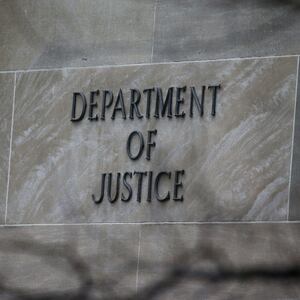When federal agents arrested the international businessman and influence-peddler George Nader in January of 2018, they found three phones, one of them containing explicit images of children, according to court filings. They also found communications with one of the Middle East’s most influential leaders, Crown Prince Mohammed Bin Zayed, the ruler of the United Arab Emirates.
Nader was an adviser to Mohammed Bin Zayed—MBZ, as he’s colloquially known—and was in touch with members of President Trump’s inner circle throughout 2016, including Blackwater founder Erik Prince. These associations eventually helped turn the Lebanese-American into a crucial cooperating witness in Special Counsel Robert Mueller’s investigation.
On Friday, Assistant U.S. Attorney Jay Prabhu said that Nader was also in touch with a representative of Saudi Crown Prince Mohammed Bin Salman.
Nader is being detained in a jail in Alexandria, Virginia, on charges of allegedly transporting child pornography and child erotica, including videos showing young children. He was arrested Tuesday when he attempted to pass through passport control at New York’s John F. Kennedy International Airport after flying in from Dubai.
During a detention hearing Friday, the government argued that Nader had a history of criminal behavior involving minors and should remain in custody. (Nader previously pleaded guilty to a federal child pornography charge in 1991.)
Nader’s defense attorney, Chris Clark, from the firm Latham and Watkins, said his client was not at risk for evading court appearances and had consistently shown up to prior hearings for other cases. Clark also said that if Nader were to be released he could be monitored by full-time security guards, paid by Nader himself, and would not have access to anyone other than his team of attorneys. He also said Nader could pay a $1 million bond co-signed by three individuals.
However, Judge Ivan Davis said the defense did not offer enough evidence to convince the court that there were no combinations of conditions of release that would reasonably ensure the safety of the community.
In the detention hearing Friday, Nader’s lawyers insisted that their client, who had undergone heart surgery, needed immediate medical attention and said that the firm had tried to send a doctor to the Alexandria Detention Center Thursday night. The doctor was turned away, Clark said.
Prabhu countered that federal agents had transported Nader to a doctor Monday for evaluation after he was arrested. That doctor, Prabhu said, told agents not to “bring healthy people in here.”
Nader was a crucial cooperater in Mueller’s investigation and was mentioned several times in the special counsel’s report, which was published in April. Nader has long worked with Democratic and Republican politicos over the last three decades. He found a foothold with Trumpworld for his ability to help broker meetings, including two closely scrutinized by Mueller.
In August 2016, Nader attended a meeting in New York with Donald Trump Jr., Blackwater founder Erik Prince, and Israeli intelligence expert Joel Zamel to discuss a social-media manipulation plan that could help Trump clinch the election in November. It’s unclear if that plan ever went forward but aides in the West Wing have said the proposal was never seriously considered. Following that meeting, though, Nader reportedly paid Zamel $2 million.
Later, after the election, Nader helped set up a meeting in the Seychelles between Prince and Kirill Dmitriev, the head of one of Russia’s sovereign wealth funds. That meeting was described extensively in the Mueller report. The Daily Beast first reported last year that Dmitriev and Prince talked about a proposed road map for U.S.-Russia relations in the Trump era.
The path ahead for Nader appears dark. A probable cause hearing in his case will be held Monday at 3 p.m.









